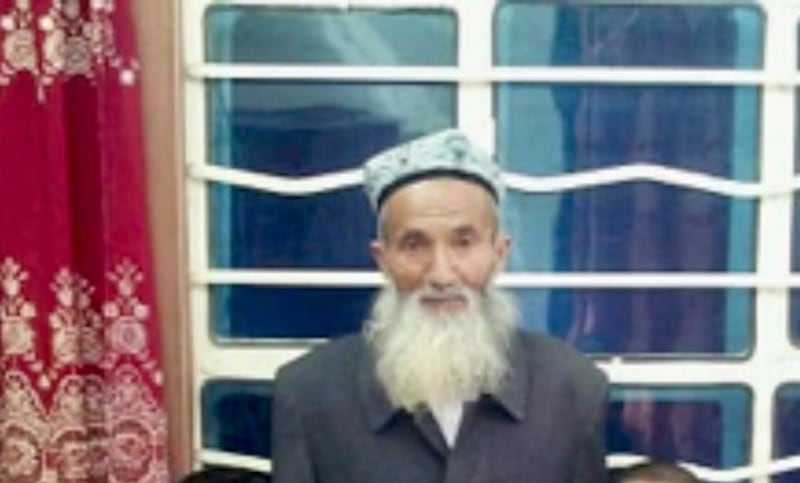A prominent U.S.-based Uyghur activist said he learned this week that his father died seven months ago in China’s far-western Xinjiang region, though the circumstances of his death remain unclear.
Abdulhakim Idris, executive director of the Center of Uyghur Studies based in Falls Church, Virginia, and former inspector general of the World Uyghur Congress, found out on Wednesday that his father, Abdulkerim Zikrullah Idris, 81, died in January in the city of Hotan, known as Hetian in Chinese.
Abdulhakim was informed of the news from a source who insisted on anonymity for safety reasons.
The last contact he had with his father was during an April 2017 phone call.
Chinese authorities in Xinjiang have detained most of his other family members since then amid the mass detentions or imprisonment of Uyghurs in “re-education camps.”
The situation reflects the Chinese government’s ongoing repression of Uyghurs and other Turkic minorities in Xinjiang, as well as of political activists like Abdulhakim, who live abroad but remain under the scrutiny of Chinese authorities and bear a substantial burden when it comes to their relatives back in Xinjiang.
Abdulhakim told Radio Free Asia that the news of his father’s death saddened him because he had limited opportunities to spend time with the man.
“He was a man of sincerity, an advocate for education, and a hard-working, diligent individual,” Abdulhakim said. “He is the reason why all of us pursued education and grew up with a strong dedication to this path.”

'A tragic norm'
Hearing about the passing of relatives after several months is not unusual for Uyghurs living in the diaspora.
“Such occurrences are increasingly becoming a tragic norm for our community,” Abdulhakim said. “Many among us avoid discussing these matters openly, so the general public may not be fully cognizant of the extent of these heartrending experiences.”
Uyghur political activists are consistently on China’s radar, subjected to surveillance, monitoring and various forms of persecution. Still, they strive to secure human rights for Uyghurs in Xinjiang and hold China to account for its actions. Ultimately, they hope to establish a Uyghur homeland called East Turkistan.
“Freedom, independence and justice are ideals that are never attained without sacrifice,” Abdulhakim said. “The people of East Turkistan have borne a heavy burden in pursuit of these ideals. Our family, too, has made substantial sacrifices and remains prepared to shoulder even more.”
Omer Kanat, executive director of the Uyghur Human Rights Project, called Abdulhakim’s father “a passionate patriot who instilled a resilient spirit within his children through his guidance.”
“Tragically, there have been additional losses within his family, with over 50 members falling victim to arrests by the Chinese government,” he said.
In recent years, Uyghurs in Xinjiang have endured what the United States and several Western parliaments have declared a genocide or crimes against humanity at the hands of China.
Uyghur political activists and nongovernmental organizations abroad have dedicated considerable effort to exposing Beijing’s oppressive actions to the global community and to trying to put an end to them.

Steadfast in their mission
Dolkun Isa, president of the World Uyghur Congress, said Uyghur rights activists such as Abdulhakim Idris remain steadfast in their mission and undeterred by potential consequences.
“I was profoundly saddened upon learning of the passing of my fellow activist, Abdulhakim Idris’s father,” he said. "We worked together to honor our moral duty to advocate for the rights of the Uyghur people. Be it me, Abdulhakim, or any fellow activist on this path, we have borne weighty sacrifices throughout the years.”
Rushan Abbas, executive director of U.S.-based Campaign for Uyghurs, also lamented news of the death of Abdul Karim Zikrullah Idris — her father-in-law.
“In this era of #AI and #Nano #technologies, #Uyghurs like myself can’t even know the whereabouts or well-beings of our loved ones,” she tweeted on Tuesday.
In 2018, the Chinese government arrested Gulshan Abbas, Rushan's elder sister, in an apparent act of reprisal for her sibling’s activism abroad, subsequently subjecting her to a 20-year prison sentence. The information came to light two years later.
Similarly, Dolkun Isa received news of the passing of his mother, Aygul Amet, in a “re-education” camp, and of his father, Isa Amet, who died at age of 86, several years after their demise.
Translated by RFA Uyghur. Edited by Roseanne Gerin and Malcolm Foster.
